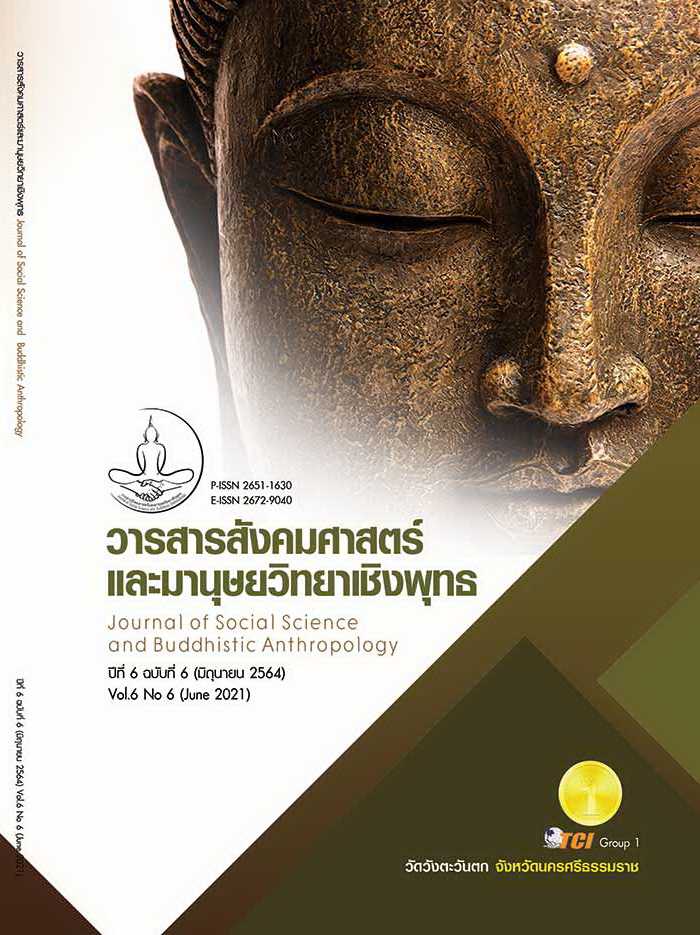THE DEVELOPMENT OF A TRAINING PROGRAM MODEL BASED ON TRANSFORMATIVE LEARNING THEORY TO ENHANCE MORAL PROJECT ADVISORY COMPETENCY OF MORAL TEACHING MONKS
Keywords:
Problems, Development, Buddhist SchoolAbstract
The objectives of this research were to 1) develop a training program model based on Transformative learning theory to enhance the moral project advisory competency of moral teaching monks and 2) study the results of experimental using of this developed training program model. This study is research and development conducted. 10 moral teaching monks were included by specific random sampling. The research tools were 1) The developed training program 2) The competent assessment forms for moral project advisor 3) Conclusion learning form 4) Writing a reflection form 5) Behavioral observation for advising of teaching monks and 6) Questionnaires. The difference in mean scores of the moral project advisory competency were analyzed by using Mean, Standard deviation and t-test for dependent samples data. The results of recent study revealed that the developed training program model based on Transformative learning theory to enhance the moral project advisory competency of moral teaching monks has 6 components 1) Principle 2) Objective 3) Curriculum structure 4) Training process that consists of 4 steps, namely, 4.1) confidence building 4.2) wisdom development 4.3) coaching practice and 4.4) Reflection to Change 5) Training materials 6) Evaluation and assessment). After using the training program model: 1) the advisory competency in the moral projects of moral teaching monks was significantly higher than before the training (p < .05). 2) The moral teaching monks who attended the training program received a cognitive score from the activities of all 7 learning units by passing the specific criterion. 3) The opinion of the moral teaching monks on the overall training course format was at the highest level ( = 4.52).
References
กระทรวงศึกษาธิการ. (2548). แนวทางการดำเนินงานโรงเรียนวิถีพุทธ. กรุงเทพมหานคร: โรงพิมพ์มหาวิทยาลัยมหาจุฬาลงกรณราชวิทยาลัย.
กานต์ เชาวน์นิรัติศัย. (2557). ผลกระทบจากการบริโภคสื่อที่มีต่อเด็ก. ใน การประชุมวิชาการปัญญาภิวัฒน์ ครั้งที่ 4 วันที่ 9 พฤษภาคม 2557. สถาบันการจัดการปัญญาภิวัฒน์.
ครู. (14 กันยายน 2563). สภาพปัญหาและแนวทางการพัฒนาโครงการโรงเรียนวิถีพุทธ. (พระศรีธรรมภาณี, ผู้สัมภาษณ์)
เชวง อุปถัมภ์. (2560). แนวทางการพัฒนาคุณภาพของโรงเรียนวิถีพุทธ สังกัดสำนักงานเขตพื้นที่การศึกษา ประถมศึกษาตาก เขต 2. ใน วิทยานิพนธ์ครุศาสตรมหาบัณฑิต สาขาวิชาการบริหารการศึกษา. มหาวิทยาลัยราชภัฏกำแพงเพชร.
บุญชม ศรีสะอาด. (2556). วิธีการทางสถิติสำหรับการวิจัย. (เล่มที่ 2). กรุงเทพมหานคร: สุวีริยาการพิมพ์.
ผู้บริหารสถานศึกษา. (14 กันยายน 2563). สภาพปัญหาและแนวทางการพัฒนาโครงการโรงเรียนวิถีพุทธ. (พระศรีธรรมภาณี, ผู้สัมภาษณ์)
พระเทพสิงหวราจารย์ (โสภณ โสภโณ ยอดคำปา). (2561). การบูรณาการพระพุทธศาสนาเพื่อสร้าง ทรัพยากรมนุษย์ในศตวรรษที่ 21. วารสารสันติศึกษาปริทรรศน์ มจร, 6(ฉบับพิเศษ), 516-526.
พระมหาศุภวัฒน์ สุขดำและคณะ. (2562). ศึกษาสภาพปัญหาการบริหารโรงเรียนวิถีพุทธ. วารสารมหาจุฬานาครทรรศน์, 6(4), 2040-2061.
โรงเรียนวิถีพุทธ. (2564). จำนวนบุคลากรของโครงการโรงเรียนวิถีพุทธ. เรียกใช้เมื่อ 19 มีนาคม 2564 จาก http://www.vitheebuddha.com/main.php?url=download _view&id=S
ศึกษานิเทศก์. (14 กันยายน 2563). สภาพปัญหาและแนวทางการพัฒนาโครงการโรงเรียนวิถีพุทธ. (พระศรีธรรมภาณี, ผู้สัมภาษณ์)
สำนักงานคณะกรรมการพัฒนาเศรษฐกิจและสังคมแห่งชาติ. (2554). แผนพัฒนาเศรษฐกิจและสังคมแห่งชาติ ฉบับที่ 11 พ.ศ. 2555-2559. กรุงเทพมหานคร: สำนักงานคณะกรรมการพัฒนาเศรษฐกิจและสังคมแห่งชาติ.
สำนักงานปลัดกระทรวงศึกษาธิการ. (2555). คู่มือกรรมการสถานศึกษาขั้นพื้นฐาน. กรุงเทพมหานคร: สำนักงานคณะกรรมการการศึกษาขั้นพื้นฐาน.
สำนักงานเลขาธิการสภาการศึกษา กระทรวงศึกษาธิการ. (2562). เเนวทางการพัฒนาสมรรถนะผู้เรียนระดับการศึกษาขั้นพื้นฐาน. กรุงเทพมหานคร: กลุ่มมาตรฐานการศึกษา สำนักมาตรฐานการศึกษาและพัฒนาการเรียนรู้ สำนักงานเลขาธิการสภาการศึกษา.
อังคณา ผุยพรม และอัศวฤทธิ์ อุทัยรัตน์. (2557). การศึกษาสภาพและปัญหาการดำเนินงานตามแนว โรงเรียนวิถีพุทธในสถานศึกษา สังกัดสำนักงานเขตพื้นที่การศึกษาประถมศึกษอุบลราชธานี เขต 3. ใน วิทยานิพนธ์ครุศาสตรมหาบัณฑิต สาขาวิชาการศึกษาปฐมวัย. มหาวิทยาลัยราชภัฏอุบลราชธานี.
Cronbach, L. J. (1990). Essentials of psychological testing. (5th ed.). New York: Harper Collins, Publishers.
Krejcie, R. V. & Morgan, D. W. (1970). Determining Sample Size for Research Activities. Educational and Psychological Measurement, 30(3), 607-610.
Likert, R. (1967). The Method of Constructing and Attitude Scale In Reading in Fishbeic, M (Ed.), Attitude Theory and Measurement. New York: Wiley & Son.
Downloads
Published
How to Cite
Issue
Section
License
Copyright (c) 2021 Journal of Social Science and Buddhistic Anthropology

This work is licensed under a Creative Commons Attribution-NonCommercial-NoDerivatives 4.0 International License.









